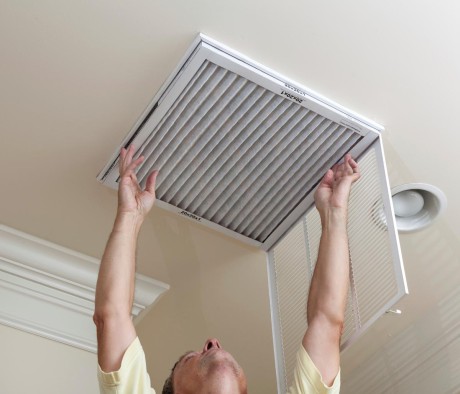
Air filters are one of the most straightforward components of your HVAC system: they filter your air. Air filters are also, however, one of the most important parts of your home comfort system. Not only do filters have positive effects on the quality of the air in your home or business environment, but they also can have harmful effects if not used properly. A clogged or ineffective air filter can cause your HVAC system to work harder than necessary, which lowers the quality of your air as well as raises the energy cost of operating your system.
Warner Service knows that every home is unique in its needs, and therefore not every home will need the same kind of air filter. The two major categories of air filters are disposable and reusable, and each category has advantages and disadvantages. Your final decision on air filters will depend on your home comfort system and your needs.
Disposable Air Filters
Disposable air filters are the more conventional and common of the two categories of filters. These filters are definitely the more user-friendly of the two types: simply install the filter in your system and then, in 1-3 months, remove the filter, dispose of it, and replace it. These filters also work well while installed and last as long as they are in place in your system. The downsides to disposable air filters include cost and environmental impact. Because disposable filters must be replaced so often, the cost of replacement can stack up quickly. In addition, disposable filters also have an impact on the environment, as they must be disposed of more often than reusable filters.
Reusable Filters
Reusable filters are appealing to homes and businesses that value cost savings and being environmentally friendly. Reusable filters generally are thicker than disposable filters, and therefore last longer. Reusable filters still must be maintained, however. Once every 3-4 months reusable filters must be washed clean of dust and dirt to keep your indoor air clean. Keeping reusable filters clean will extend their life beyond disposable filters, but dirt will still form permanently on reusable filters over time, and performance will begin to suffer. Because of this, reusable filters should be replaced about once every 5 years. However, even despite their higher price upfront, the overall lifespan of the filters ends up saving you money in the long run. Plus, because they are only disposed of once every 5 years, the waste produced by reusable filters is minimal in comparison.
Efficiency Ratings
After deciding on which type of air filter if right for your situation, you should also consider the efficiency you will need. Air filters, both disposable and reusable, are rated according to the size of the particles they can filter. These ratings are according to the Minimum Efficiency Reporting Value (MERV) scale. A lower MERV number means that the filter will be effective at removing larger particles, such as pollen, dust mites, and and carpet fibers. A higher MERV rating means that bacteria, viruses and even smoke will be caught in the filter. Yet another acronym that matters is HEPA, or High Efficiency Particulate Air filters, which use static electriciy to further catch particles in the air. The correct efficiency will depend on where the filter will be located. HEPA filters as well as those with high MERV ratings may sometimes restrict airflow, whereas filters with lower MERV ratings will often not filter as well.
A compromise may be to install a UV Light Filter system to be used with a HEPA filter, separated from the main ductwork. This setup will allow for optimal filtering without sacrificing airflow performance. Most homes, however, will still have a pleasant experience with a medium to high MERV rated filter in their home
Warner Service knows that every HVAC system is different. If you would like personalized help in selecting an air filter for your home, please contact Warner Service to help you find the right filter.

